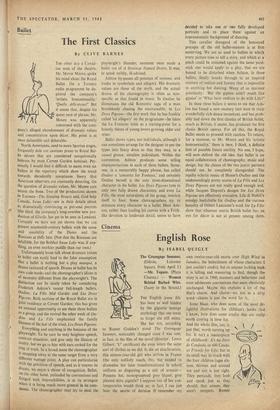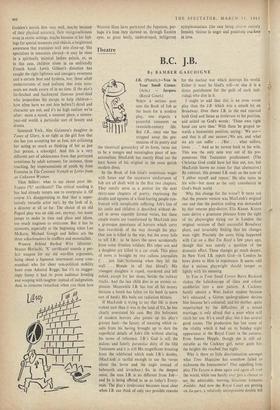Cinema
English Rose
By ISABEL QUIGLY The Greengage Summer.
(Odeon, Leicester Square, from April 5.) —Mr. Topaze. (Plaza Cinema.) — Women Behind Barbed Wire. (Jacey in the Strand.) THE English jeune file has been so well hidden by the gigantic teenage mythology that one tends to forget she still exists. She has not, according to Rumer Godden's novel The Greengage Summer, noticeably changed since I was one; in fact, in the film of the novel (director: Lewis Gilbert; 'U' certificate) she even wears the same sort of clothes as we did. Is she an anachronism, this sixteen-year-old girl who arrives in France (the only unlikely touch, this, but needed to dramatise her later transformations) in school uniform as disguising as a suit of armour— Panama hat, monogrammed grey blazer, grey pleated skirt, pigtails? I suppose lots of her con- temporaries would think so; in fact, I can just hear the snorts of derision (I remember my own twelve-year-old snorts over High Wind in Jamaica, the babyishness of whose characters I just couldn't credit); but to anyone looking back it is lulling and reassuring to find, though the story is set in 1960, manners and behaviour and even adolescent conventions that seem absolutely unchanged. Maybe this explains a lot of the film's charm. And charm—no, not as a dirty word—charm is just the word for it.
Irene Haas, who does some of the most de- lightful illustrations for children's books that I know, here does some credits that are really worth coming in time for.
And the whole film, too, is 1 just that, worth turning up for. It isn't a masterpiece — of childhood : it's no Zero de Conduite, or 400 Coups, or Friends for Life; but in its small way its touch with the four children (ages six- teen, thirteen and around ten and six) is just right. They persuade, they look and speak just as they should, they amuse, they aren't moppets. Rumer Godden's novels film very well,, maybe because of their physical accuracy, their recognisableness even in exotic settings, maybe because of her feel- ings for special moments and objects, a heightened awareness that translates well into close-up. She specialises in innocents abroad—it may be nuns in a spiritually inimical Indian palace, or, as in this case, children alone in an unfriendly French hotel. Lewis Gilbert's direction has caught the right lightness and unsugary sweetness and a certain heat and hysteria, too; those adult undercurrents of mad jealousy that even inno- cents are made aware of in no time. If the plot's far-fetched and hackneyed (famous jewel-thief who jeopardises his escape to help children--, how often have we met him before?) detail and character are not, and it's no high realism we're after: more a mood, a summer place, a sixteen- year-old world, a particular sort of beauty and drama.
Susannah York, Alec Guinness's daughter in Tunes of Glory, is so right as the girl Joss that she has you accepting her as Joss, not criticising her acting so much as thinking of her as just that person, a schoolgirl. And this is a very different sort of adolescence from that portrayed sometimes by adult actresses; for instance, those touching, fey impersonations of youth by Joan Fontaine in The Constant Nymph or Letter from an Unknown Woman.
Then Sellers: what to say about poor Mr. Topaze ('U' certificate)? The critical mauling it has had already tempts one to overpraise it. Of course it's disappointing to find that a super- latively versatile actor isn't, by the look of it, a director at all so' far. The choice of an old Pagnol play was an odd one, anyway, too many jumps to make in time and place and idiom, too much staginess to overcome. But it has its moments, especially at the beginning when Leo McKern, Michael Gough and Sellers are the three schoolmasters in mufflers and moustaches.
Women Behind Barbed Wire (director : Manao Horiuchi; 'X' certificate) sounds a per- fect weapon for my old war-film arguments, being about a Japanese internment camp com- mandant who for sheer non-political nobility beats even Admiral Rogge, but it's so stagger- ingly funny it had its press audience howling and weeping with laughter instead of indignation. And, as someone remarked, when you think how Western films have portrayed the Japanese, per- haps it's time they showed us, through Eastern eyes, as great beefy, underdressed, belligerent nymphomaniacs (the cast being almost entirely female), vicious in anger and positively crackers ri in love.



































 Previous page
Previous page